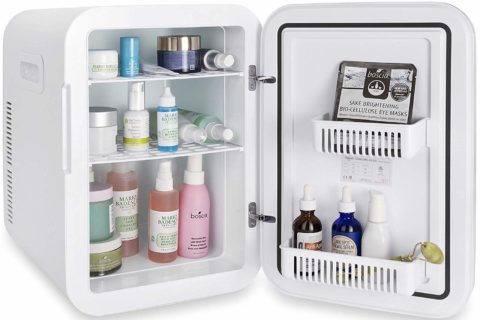What’s the Deal with Skincare Mini-Fridges?
Will refrigeration extend the shelf life of products and boost effectiveness? Two experts weigh in.
If you follow any number of beauty influencers on social media, chances are you’ve seen a certain kitchen item cropping up in closets, changing areas and on bathroom counters. In lieu of snacks and mini bottles of booze, mini-fridges have been appropriated by the beauty trend-making crowd, which they’re packing with skincare products instead—everything from sheet masks to eye balms and night creams. The thinking seems to be that products kept cool stay preserved longer and boost the effectiveness of products. But how much truth is there to the trend?
“I wouldn’t say that it’s a necessity…It’s more like an extra touch of luxury, ” says Melissa Sarps, lead therapist at Caudalie’s Meatpacking location in New York City. “Maybe if the products have probiotics in them, but regular products and natural products are generally fine to be kept at room temperature, as long as there’s no extra humidity or dryness in the room.” Cosmetics companies have hopped on the cooling bandwagon, with a handful of mini-fridges now on the market billed as “skincare fridges.” According to one such retailer, Makeup Fridge, keeping products refrigerated “not only helps to prolong their shelf-life but cold products also help to temporarily reduce facial puffiness.” But, wouldn’t anything cold have that de-puffing effect? Like, a bag of peas, for instance? “If you’re in summertime and you put a cooling cream on your skin, of course it’s going to feel good,” says Sarps. “Maybe you’re going to be a bit more glowing, but is it absolutely necessary? Do we all need to have a mini-fridge? I don’t think so.”
Dr. Roni Munk of Montreal dermatology clinic Munk MD is of a similar mind. “Do I think refrigeration of a skincare product is necessary? No. If it’s a good skincare product, it will be stable at room temperature… How do you even know that the temperature you’re cooling a product it is going to be more effective?” Ingredient stability is an argument that has been brought to the table in defence of the skincare fridge, with Vitamin C cited as a particularly vulnerable ingredient. However, in order for Vitamin C to work in a formula, it has to be stabilized with other ingredients. There are certain exceptions: “Some ingredients we recommend refrigerating—prescription acne creams, for instance—but the general creams people are using from stores or medical-grade products do not need refrigeration.”
The consensus? Using chilled out products on your face feels nice. Having a fridge to store your favourite products in is fun. Do you need to go out and buy a mini-fridge to ensure the effectiveness of your products? It seems the answer is no. “If you really want a result, you’re going to want to use medical grade ingredients that are stable at room temperature,” says Dr. Munk.








